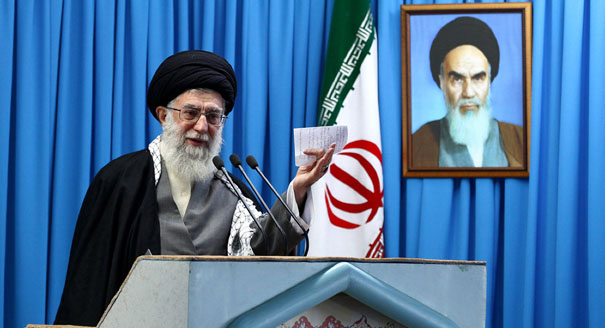- +1
Toby Dalton, Mark Hibbs, Nicole Grajewski, …
{
"authors": [
"Mark Hibbs"
],
"type": "legacyinthemedia",
"centerAffiliationAll": "dc",
"centers": [
"Carnegie Endowment for International Peace",
"Malcolm H. Kerr Carnegie Middle East Center"
],
"collections": [
"Iranian Proliferation",
"Korean Peninsula"
],
"englishNewsletterAll": "",
"nonEnglishNewsletterAll": "",
"primaryCenter": "Carnegie Endowment for International Peace",
"programAffiliation": "NPP",
"programs": [
"Nuclear Policy"
],
"projects": [],
"regions": [
"Middle East",
"Iran",
"East Asia",
"South Korea"
],
"topics": [
"Nuclear Policy"
]
}
Source: Getty
Is a Nuclear Iran Inevitable?
A nuclear weapon in the hands of Iran is by no means inevitable.
Source: Atlantic
Mark Hibbs is a former journalist who has been covering the more technical, and, to the general public, nearly invisible side of nuclear proliferation issues for more than 30 years. In 2006, The Atlantic's William Langewiesche wrote that Hibbs "must rank as one of the greatest reporters at work in the world today."
In the second part of our interview, Hibbs, who is now a Bonn-based senior associate with the Carnegie Endowment for International Peace, discusses whether he thinks Iran will get nuclear weapons, and analyzes the possible significance of what's turning into a contentious negotiation between the United States and South Korea on a nuclear cooperation agreement.
You mention that there are countries like Iran that don't necessarily pursue the path to the bomb in terms of months or years -- they pursue it in terms of slow progress that reaches a kind of momentum where it's almost irreversible. Do you think that we've reached the point with Iran where they've slowly built their capability to the point that it's inevitable that they get the bomb, unless there's something major like war, an attack or some sort of internal social breakdown that prevents them from getting there?
No, I don't believe that. I think that most analysts would conclude that between the period of around the middle of the 1980s and today, there have been forces in Iran that have led certain people in the decision-making structure to try to have a nuclear weapons capability. There are probably others in the system who didn't want that. Iran is by no means a monolithic country....Iran right now has a decision to make. It has acquired considerable nuclear capability which have brought them very far along down a path towards obtaining a nuclear weapons capability. There's no question about that in my mind. But right now it's up to Iran to decide whether it's going to draw a red line there, or whether it's going to cross it. And I think there's no consensus right now about which direction Iran's going to move in.
We're having another negotiation in a matter of days [note: negotiations in Almaty, Kazakhstan concluded earlier this week]. In just a couple of months there is going to be a pivotal election in Iran. And essentially it's going to be up to the Iranians to decide whether they want this capability or whether they don't want it. And it's up, of course, to the rest of us in the P5+1 that are negotiating with Iran to persuade them to back away from that choice.
A nuclear weapon in the hands of Iran is by no means inevitable.
Another country that might want nuclear weapons is South Korea. Do you think that South Korea will eventually have nukes -- and do you think that they'll leave the NPT as well?
For years, the subject of South Korea having nuclear weapons has been a taboo. There was a secret program in South Korea back in the late 1970s under president Park Chung-Hye, and the U.S. basically came in and shut it down.
At the time, the quid pro quo of that was that they made sure the Koreans understood that the United States was going to take seriously the pledges that it had made under their bilateral defense agreement [see here ] to come to the defense of South Korea in the event of an attack by North Korea.
Today, we're in a similar situation. North Korea is revving up all kinds of pressure to essentially change the calculus on the ground. They're trying to make South Korea nervous. The ultimate aim of the Kim regime has got to be to try to decouple South Korea from the United States, and to drive a stake right into the heart of the U.S.-South Korea alliance.
The dynamic is the same as when Park Chung-Hye was in power in the 1970s. Park's daughter, Park Guen-Hye is the new president of South Korea, and she is basically in a similar situation to the extent that she's facing increasing threats from the North...
This escalation is happening in the middle of a negotiation that's been going on for two years, where the South has been trying to get the United States to agree to give them a blanket agreement to do things in its civilian nuclear program that look like sensitive activities, like plutonium reprocessing. [See here for more of Hibbs's analysis of the proposed U.S.-South Korean civilian nuclear cooperation agreement.]
Would they want the ability to reprocess plutonium just to send a message to the North, or because they actually want to give themselves themselves the option of launching a serious nuclear weapons program?
Neither. The primary reason the South Koreans want this capability is that it has thousands of tons of used power reactor fuel that they have to dispose of, and they want to use the technology to do that.
"The threats from North Korea have escalated, and the South Koreans have come to the U.S. and said, we want to see the U.S. do more to show that your guarantees to defend us under our bilateral agreement are reliable."
The problem is that there's a difference....about how to move forward on this issue. The U.S. has not been willing to seriously engage with the South's legitimate claim that it is a member of the NPT, that its nuclear materials are declared and verified by the [International Atomic Energy Agency] as not being for nuclear weapons, and that they have bona fide, legitimate reasons for going forward with these sensitive nuclear activities.
The mantra from South Korea is that these capabilities that they are seeking --enrichment and pyro-processing -- don't have anything to do with North Korea. And that's clearly not true, because essentially, in 1992, the two Koreas pledged not to have reprocessing and enrichment on the Korean peninsula. When the North Koreans violated that agreement by setting up an enrichment plant in 2010, that provided the South Koreans an opening to go back to the U.S. and say okay, because North Korea has violated that pledge, now we want to have enrichment and pyro-processing capabilities.
There's a direct connection between the South Korean quest for these activities and the North Korea dilemma. So, the question is, is the U.S. worried about South Korea misusing that technology?
Should we be?
Let me put it this way: since the threats from North Korea have escalated, the Koreans have come to the U.S. and said, we want to see the U.S. do more to show that your guarantees to defend us under our bilateral agreement are reliable.
And the steps that we're seeing -- overflights of B2s, decisions by the U.S. to deploy missile defense installations and so forth -- this is the beginning of a discussion that the U.S. and South Korea will have over several months, to address this residual concern by South Korea that the U.S. defense guarantee is not credible.
Before we get to a point where the South Koreans would even think about having nuclear weapons, you can assume that the South Koreans and the U.S. would go into a room together and talk about what they can do to bolster the U.S. deterrent against an North Korean attack, including against a nuclear attack, and prepare for a number of North Korean threats.
That being said, if you ask me if I believe that regardless of the taboo that exists over this entire subject ... if the U.S. government thinks about the prospect of South Korea becoming a nuclear-armed state? Of course I do. Of course people in the U.S. government think about this.
There is a residual concern about the possibility, remote as it may be, that these technologies, if Korea were to obtain them, could in a very, very dire scenario lead to a false confidence on the part of South Korean politicians -- backed, incidentally, by a public which by a large margin believes in a very foggy way that having nuclear weapons would be good for Korea -- that in a very extreme scenario, the Koreans could be tempted to leave the NPT.
It's by no means conventional wisdom. But it is something that people think about. And it's an issue in part because of the past legacy under President Park. There have been some other occasions where the Korean research establishment controlled by the government has enriched tiny amounts of uranium without declaring it. They have separated tiny amounts of plutonium. The amounts are not by any means a serious concern. What is of some concern is ultimately the motivation and the attention of the people getting involved in those activities.
...This concern about South Korea should be factored into the decision that is made by both governments about how to move forward with this civilian nuclear cooperation agreement.
Either the South Koreans should think twice right now about whether they want to go ahead with these sensitive technologies as long as North Korean nuclear weapons pose a growing threat. Or the alternative would be that if in fact the United States is prepared to let South Korea pyro-process and enrich uranium under the agreement, then both sides should agree to very clear conditions under which that activity could take place.
That would mean that conditions would have to conform to requirements in U.S. law, including in the Atomic Energy Act, which says that a decision by the United States in a cooperation agreement with a partner should be such that the activities covered, included, or permitted under the agreement would "not be inimical to the common defense and security" of the U.S., and furthermore that they would not result in a significant increase in the risk of proliferation...
My understanding is that the South Korean government has taken the position in principle that this negotiation has nothing to do with the North Korean threat, and by consequence has nothing to do with any scenario suggesting that South Korea would leave the NPT or move towards development of nuclear weapons. I can understand that from the point of view of South Korea's research and science community. But it's clear that there is a nexus between South Korea's request to have the United States honor its resolve to have pyro-processing and enrichment, and the North Korean situation. If it weren't for the fact that North Korea had violated the agreement from 1992, the South Korean request for enrichment and reprocessing would not be on the table at all.
About the Author

Nonresident Senior Fellow, Nuclear Policy Program
Hibbs is a Germany-based nonresident senior fellow in Carnegie’s Nuclear Policy Program. His areas of expertise are nuclear verification and safeguards, multilateral nuclear trade policy, international nuclear cooperation, and nonproliferation arrangements.
- Dimming Prospects for U.S.-Russia Nonproliferation CooperationArticle
- What Comes After Russia’s Attack on a Ukrainian Nuclear Power Station?Commentary
Mark Hibbs
Recent Work
Carnegie does not take institutional positions on public policy issues; the views represented herein are those of the author(s) and do not necessarily reflect the views of Carnegie, its staff, or its trustees.
More Work from Carnegie Endowment for International Peace
- The Gulf Monarchies Are Caught Between Iran’s Desperation and the U.S.’s RecklessnessCommentary
Only collective security can protect fragile economic models.
Andrew Leber
- Duqm at the Crossroads: Oman’s Strategic Port and Its Role in Vision 2040Commentary
In a volatile Middle East, the Omani port of Duqm offers stability, neutrality, and opportunity. Could this hidden port become the ultimate safe harbor for global trade?
Giorgio Cafiero, Samuel Ramani
- Europe on Iran: Gone with the WindCommentary
Europe’s reaction to the war in Iran has been disunited and meek, a far cry from its previously leading role in diplomacy with Tehran. To avoid being condemned to the sidelines while escalation continues, Brussels needs to stand up for international law.
Pierre Vimont
- Governing Aging Economies: South Korea and the Politics of Care, Safety, and WorkPaper
South Korea’s rapid demographic transition previews governance challenges many advanced and middle-income economies will face. This paper argues that aging is not only a care issue but a structural governance challenge—reshaping welfare, productivity, and fiscal sustainability, and reorganizing responsibilities across the state, private sector, and society.
Darcie Draudt-Véjares
- What We Know About Drone Use in the Iran WarCommentary
Two experts discuss how drone technology is shaping yet another conflict and what the United States can learn from Ukraine.
Steve Feldstein, Dara Massicot











